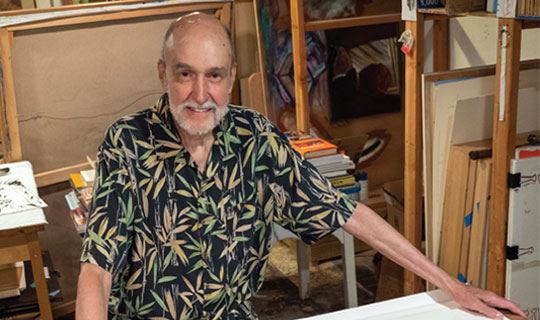“It was kind of miraculous. I woke up the next morning and I thought, God, I feel great!”

How a Leaky Mitral Valve Can be Treated Without Major Surgery
When he’s in the downstairs art studio of his Montclair home, Chris Pelletiere, 79, creates vibrant collages that capture the energy and movement of transit commuters. But last summer, Chris noticed a decline in his own energy level.
“I was getting short of breath climbing the stairs,” he says. “I had to sit down after every walk, no matter how short it was. I couldn’t exercise. I felt like I was 100 years old.”
Chris assumed the problem was heart-related. He’d had a coronary stent and pacemaker-defibrillator (ICD) implanted in 2018 to control his heart’s rhythm after he had experienced cardiac arrest. One year later, that ICD saved his life when it treated a second life-threatening arrhythmia. He recovered well from both episodes and worked his way back up to two-mile-a-day walks, which is why his fatigue came as a surprise.

To find answers, he turned to David Dobesh, MD, a cardiologist at RWJBarnabas Health and a member of RWJBarnabas Health Medical Group. “He did an echocardiogram and showed me that my mitral valve was leaking,” Chris recalls. “Then he said he could repair it with MitraClip. I had never heard of it before.”
A Minimally Invasive Fix
Types of mitral valve disease include mitral regurgitation, which is a backward leakage of blood, from structural (degenerative) disease due to valve deterioration and from functional mitral valve disease, which can be caused over time by congestive heart failure. Chris had the latter condition.
MitraClip is approved by the U.S. Food and Drug Administration for both of these conditions. It’s a tiny device—smaller than a dime—that literally clips a leaky mitral valve to restore the valve integrity.
“The mitral valve has two leaflets, or flaps—anterior and posterior—that are designed to come together and close like a one-way door,” Dr. Dobesh explains. “Over time, the valve can leak in between the two leaflets, impairing performance of the heart.” MitraClip essentially closes that gap through the placement of one or more clips.
Before MitraClip, the only way to treat a leaky mitral valve was through open-heart surgery. “But the older a person gets, the harder it is to recover from a major operation,” Dr. Dobesh says.
During the MitraClip procedure, the doctor inserts a small tube, called a catheter, into the right leg vein and guides it up to the heart. He then navigates the clip through the catheter.
“The delivery mechanism, guided by a special ultrasound called transesophageal echocardiogram, allows us to place the clips in just the right position,” Dr. Dobesh says.
Improved Outcomes
Dr. Dobesh first performed the MitraClip procedure in 2018. Since then, he’s completed more than 100 successful MitraClip implants at Saint Barnabas Medical Center and at Newark Beth Israel Medical Center, and he expects to offer MitraClip at Jersey City Medical Center starting next year.
A clinical trial determined that MitraClip leads to a 33 percent reduction in heart failure mortality and a 51 percent reduced risk for heart failure hospitalization. According to another study, patients receiving MitraClip are more than twice as likely to experience a large improvement in quality of life. “MitraClip leads to fewer complications, fewer days in the hospital and faster recovery than open- heart surgery,” Dr. Dobesh says.
The RWJBarnabas Health cardiac program takes a team approach to MitraClip, with electrophysiologists, interventional cardiologists, cardiac surgeons, imaging cardiologists, nurses and anesthesiologists all playing a role in creating optimal patient outcomes.
“Over the past year, we’ve achieved an average reduction of severity of patients’ mitral valve regurgitation by 2.9 grades,” Dr. Dobesh says. “That exceeds the national average of 2.6.”
Back To Normal
Despite the fact that Chris had never heard of MitraClip, he had faith in his cardiologist. “Dr. Dobesh was very personable. There was something about him that just made me comfortable,” he says.
In March, Dr. Dobesh performed the MitraClip procedure on Chris. “It was kind of miraculous,” Chris says. “I woke up the next morning and I thought, God, I feel great!” He went home the day after the procedure.
Prior to the procedure, Chris’s heart function was between 25 and 30 percent. Follow-up testing two months after the procedure showed that his heart function had climbed to 56 percent. “That’s the normal range,” Dr. Dobesh says.
Today, Chris is back to walking a mile and a half, and taking the stairs to and from his art studio is a breeze. “Everything is like magic now,” he says. “It’s incredible.”
“Many patients get to the point where Chris was and assume their symptoms are caused because they’re getting older,” Dr. Dobesh says. “But Chris is a great example that you’re never too old to have a heart valve repaired.”
Whoever your heart beats for, our hearts beat for you. To connect with a top cardiovascular specialist at RWJBarnabas Health, call 888-724-7123 or visit Heart and Vascular Care.